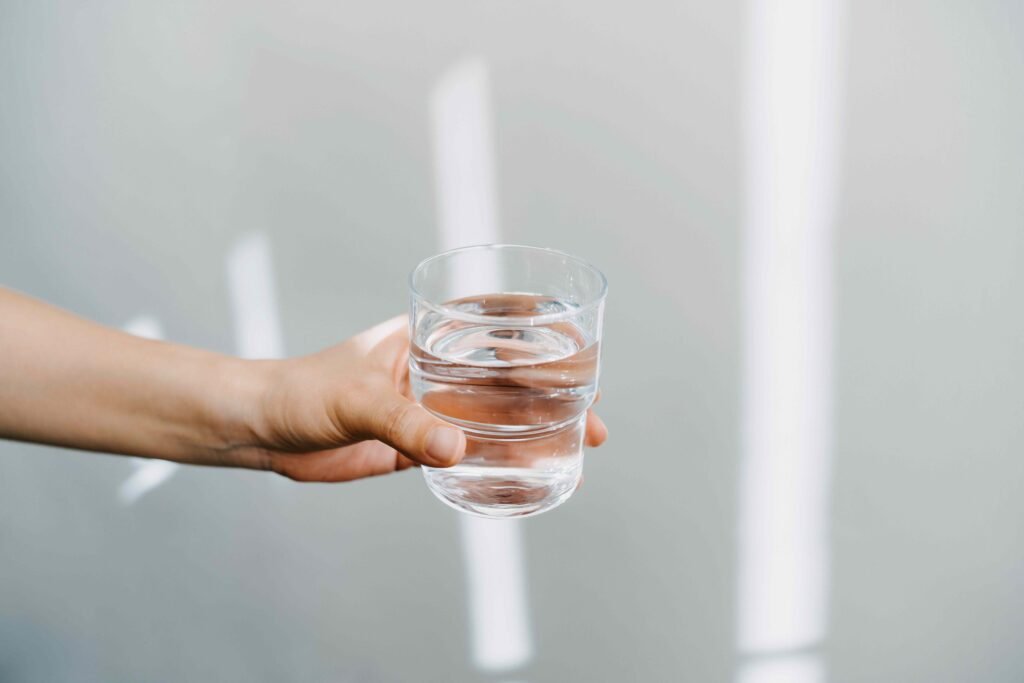High blood pressure, or hypertension, occurs when the force that your blood exerts on the walls of your arteries and veins is higher than normal. Along with medications and lifestyle changes, drinking enough water may help manage blood pressure.
Drinking water may help lower blood pressure in some cases—primarily, if you’re dehydrated. And those with high blood pressure tend to be less hydrated, according to research published in 2022.
Experts believe that drinking water helps control blood pressure by preventing dehydration. When your body is dehydrated, your blood—which is made mostly of water—loses volume, which may lead to electrolyte imbalances, including concentrated levels of sodium (salt) and other minerals in your blood.
Increased sodium concentrations can cause your body to release a hormone called vasopressin, which regulates water retention and narrows your blood vessels. In turn, this increases the force—or pressure—on your blood vessel walls.
Drinking water may help reduce these effects of dehydration in your body.
A common recommendation for daily water intake is about six to eight glasses of water a day, or 64 fluid ounces. Researchers found this amount effective in multiple studies.
But how much water you need can depend on many factors. These include:
- Your age
- Your sex
- How much you weigh
- The climate you’re in
- How much physical activity you get
- Whether you’re pregnant or breastfeeding
For instance, you need more water on a hot day or if you sweat during a workout.
For blood pressure, it’s also important to find a balance and get the water you need without overdoing it. You can best support your cardiovascular health by avoiding both dehydration and overhydration, which may lead to fluid overload.
Fluid Overload and High Blood Pressure
In some cases, blood pressure increases due to too much water or fluid in your body. Hypervolemia occurs when your body retains too much fluid and can’t remove enough of it. Increasing overall blood volume increases stress on your blood vessel walls, leading to hypertension.
Health conditions like cirrhosis (liver scarring), kidney disease, and heart failure are common causes of hypervolemia. Another is consuming too much salt in your diet.
In addition to water, other drink options may help control blood pressure. Consider these options to help meet your daily needs for fluid intake:
- Beet juice: Research published in 2024 suggests that drinking beet juice every day can help lower systolic blood pressure in those with high blood pressure. Nitrates in the beets widen blood vessels, lowering blood pressure.
- Tomato juice: A study of adults with high blood pressure and high low-density lipoprotein (LDL, or “bad”) cholesterol found that one year of drinking unsalted tomato juice every day improved both measures, reducing the risk of cardiovascular diseases.
- Pomegranate juice: Because it has many polyphenols—compounds rich in antioxidants—pomegranate juice may help lower blood pressure, according to a 2017 study that evaluated data from eight randomized control trials.
- Cranberry juice: In a study of adults with excess bodyweight and high blood pressure, consuming about 16 ounces of cranberry juice a day for eight weeks helped decrease blood pressure.
- Green or black tea: Green tea may be more effective than black tea, but drinking either type can help lower blood pressure. You may have better results if you drink it daily over several months.
- Electrolyte water: In one study, those who drank water with magnesium and calcium (electrolytes that influence how your blood vessels widen or contract) had a lower risk of high blood pressure than people who drank plain water. Potassium is another electrolyte found in some beverages that can be beneficial for lowering blood pressure. Be mindful of drinks that contain sodium, which can increase blood pressure.
Hydration is just one of many factors may influence blood pressure. Drinking water can help as part of a broader plan for cardiovascular health that includes other heart-healthy lifestyle approaches. These tips may help:
- Modify your diet: Increase how much potassium you eat, and reduce salt (sodium). Following a dietary plan like the DASH diet can help you emphasize fresh fruit, vegetables, whole grains, and lean proteins.
- Avoid smoking: Smoking raises blood pressure, but avoiding this habit helps reduce the risk of cardiovascular diseases.
- Get active: Aim to get at least 150 minutes of moderate intensity exercise and 75 minutes of vigorous exercise per week.
- Sleep well: Aim for seven to nine hours of uninterrupted rest each night, maintaining consistent sleep and wake-up times.
- Limit drinking: Excess alcohol use can also impact blood pressure, but cutting back can help.
- Manage your weight: Reach or maintain a weight that’s healthy for you through diet, exercise, or other methods your doctor may recommend.
- Manage stress: Meditation, mindfulness exercises, physical exercise, and relaxing activities, like listening to music, may help.
Drinking enough water—about eight cups per day—may help support healthy blood pressure by protecting against dehydration, which can cause spikes in blood pressure. Alone, drinking more fluids may not treat high blood pressure, though it can play a role in managing this condition along with other lifestyle approaches and medication as needed.

